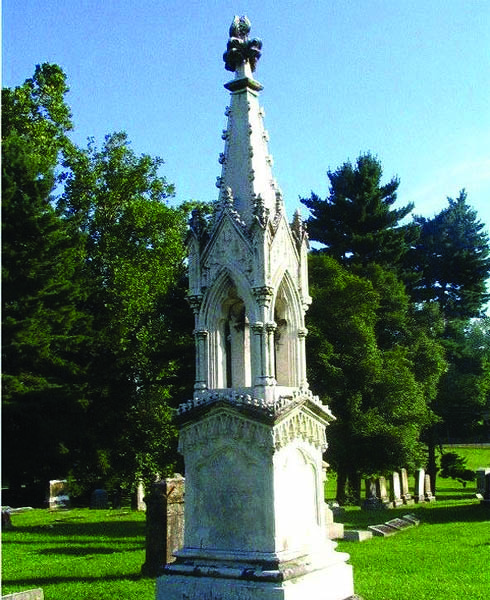The Lion of White Hall, conclusion
From the Mountains

A memorial to Cassius Marcellus Clay Jr.
He told about when he was nearly killed within a mile of his White Hall estate near Lexington, Kentucky.
“It was during the political campaign of 1849,” he said during an interview in 1891. “There was a political discussion with a man named Turner. I was opposed to slavery and he was in favor. The men who had slaves were with Turner. I knew I was in a dangerous situation and I didn’t have my pistols although I did have my bowie knife.”
The slavery matter was a very volatile issue and as it became more heated Turner’s son rushed Clay, telling him he was lying and struck him.
“It seemed like there was a conspiracy against me as several men grabbed me and pulled me backwards,” Clay related. “At first I thought they were trying to prevent a fight. I didn’t think much of it but one of them jerked my knife away from me. Several of them began hitting me with clubs before someone reached around from behind and stabbed me real bad.
“I bled like a stuck pig. I thought I was a dead man so I determined to kill the man who incited the riot against me. I grabbed my bowie knife, nearly severing two of my fingers in the process. I flourished it high over my head and told the crowd to get out of my way. I rushed Turner and cut him in the stomach but then I started to pass out due to loss of blood.
“My son arrived with my revolvers at this time but I was unconscious due to the serious wounds. It saved me that my enemies thought I was dead. I was carried to my home which was nearby. With the severity of my condition having been stabbed in the chest and lung it was uncertain for several days if I would live.
“After several weeks my body began to mend. My wounds healed and I got well again. I didn’t know how Turner fared in the fight because of my condition but I soon learned that he had died.”
Clay said the fight and Turner’s resultant death caused much discussion among the abolitionists in the north but some of them criticized him for his participation.
“Dr. Bailey, the editor of a Washington newspaper said I would have aided the cause even if I had died,’ but I wasn’t going to voluntarily oblige them with that.”
Cassius Clay thought the commentary was improper. He had long since turned against slavery and freed the slaves of White Hall before his father’s passing. He had also fought for the abolition of slavery when other men would not speak or act.
Clay returned to White Hall after the war and lived there with his adoptive son, Launey Clay who he had brought from Russia.
Perry White and the other servants stole his silver and furniture while plundering the plantation. They poisoned his son and attempted to kill the elder Clay as well. He fired them and warned them not to set foot on his property. Perry White threatened to kill him.
He saw White in his nearby woods one morning while Clay was out riding. Clay drew his pistol on White. When White jerked out his pistol Clay shot him in the neck. His next shot was through the heart. Clay was acquitted for self-defense in the trial that followed.
Clay explained that there were many occasions when he was able to step around possible trouble. The novelist Julian Hawthorne reviewed a copy of Clay’s memoirs and criticized him severely and discussed the chastity of his wife.
“I was quite angry,” Clay remarked. “I didn’t think I could make anything financially so I determined to make him apologize or fight. Upon receipt of my information Hawthorne wrote a retraction and published it, ending the matter. If he had not done so I was prepared to challenge and if he didn’t reply, I would have shot him on the streets. I did not care what he had said about me, but I made him retract his remarks about my wife.”
The interview Cassius Clay had with correspondent Frank George Carpenter occurred in 1891 when Clay was 81 years of age. He would have covered several more of his life episodes but the fire burned low and the clock struck 12. Clay rose handed his guest a traveling lantern and said it was time for him to retire.
“As for the code duello,” he told Carpenter after a final question, “it is a savage way of settling a difficulty but there are some cases where it seems to be the only remedy.”
Copyright 2023 Jadon Gibson. Code duello appears to be the remedy of action in the next issue. Jadon Gibson is an Appalachian writer from Harrogate. His stories are both historic and nostalgic in nature. Thanks to Lincoln Memorial University, Alice Lloyd College and the Museum of Appalachia for their assistance.

